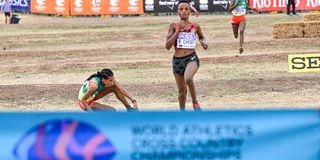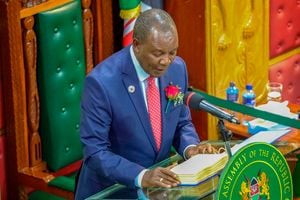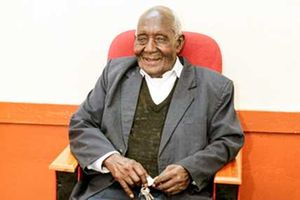Team Kenya athletes certainly deserve state reception, honours

Ethiopia's Letesenbet Gidey (left) falls close to the finish line as Kenya's Beatrice Chebet runs to win the women's senior race during the 2023 World Cross Country Championships at Mount Panorama in Bathurst on February 18, 2023.
What you need to know:
- Instead of landing to red carpet parties, they often arrive to the prying eyes of customs officials, some even losing new training shoes in the process for “failing to pay tax on new equipment.”
- I hope that, for once, we shall accord our athletes the respect they deserve, if only to encourage the young ones after them that it indeed pays to wear national colours and to get onto global podiums.
On a memorable March 23 in 1986, Kenyan cross country specialists Sisa Kirati and Some Muge threw down the gauntlet, taking the lead in the first lap of the World Cross Country Championships’ senior men’s race at the Planeyse Field in Neuchatel, Switzerland.
The rest of the field was unperturbed because, after all, Kenya hadn’t won a senior world cross country title before with Europe dominating, underscored by Portugal’s Carlos Lopez’s back-to-back titles in 1984 and 85.
But then John Ngugi joined the fray at kilometre three (covered in a three minutes, three seconds pace) and unleashed 2:53 and 2:52 splits for the next two kilometres to open up an 11-second advantage.
The now stunned field then took note, with Ethiopians Abebe Mekonnen and 1983 winner Bekele Debele giving chase, briefly reining in Ngugi before the Kenyan legend turned on the afterburners to win the race, five metres clear of silver medalist Mekonnen.
It was an historic victory as it marked Kenya’s first ever senior men’s title since the World Cross Country Championships started in Waregem, Belgium, in 1973, and also the first of Ngugi’s record five world titles, four of them back-to-back from 1986 to 1989, the fifth coming in 1992.
Paul Tergat would later equal Ngugi’s feat, taking five straight titles from 1995 to 1999.
Ngugi’s triumph heralded the era of Kenya’s endless dominance of cross country running, with Kipkemboi Kimeli having become the first Kenyan ever to win a world cross country title by taking the junior men’s title a year earlier in 1985 in Lisbon, Portugal, while running barefoot.
Lydia Cheromei then became the first Kenyan female world champion, winning the 1991 junior women’s title in Antwerp, Belgium, where she also became the youngest ever world champ at 13 years and 317 days.
Our first senior women’s champion was Hellen Chepng’eno in 1994 (Budapest) with Kenya having kept the title since Florence Kiplagat reclaimed it in 2009 at the Al-Bisharat Golf Course in Amman, Jordan.
This dominance was cemented by Team Kenya’s overall victory at the 44th edition in Bathurst, Australia, last weekend where we topped the medals table with six gold (including team titles), two silver and as many bronze, with Ethiopia a distant second with 2-7-1.
Hats off to race winners Ismael Kirui (men’s under-20), Beatrice Chebet (senior women) and the mixed relay quartet of Emmanuel Wanyonyi, Mirriam Cherop, Kyumbe Munguti and Brenda Chebet.
Being the best in the world in anything shouldn’t be taken for granted, least of all dominating global distance running by a mile.
But, sadly, over the years, many of our star athletes have died in abject poverty having lived their lives in deplorable conditions despite bringing glory to the county.
I won’t mention names for now, but going down the roster of Kenya’s world cross country champions over the years, one can’t help but weep on learning of their latter day misery.
Some have since died, many hugging the tipple out of frustration, with air force man, Lieutenant Colonel Tergat, who is also the National Olympic Committee of Kenya President, one of the rare success stories in life after athletics.
These gallant men and women fly our nation’s flag high, and with pride.
It thus behoves us to bend over backwards to celebrate them whenever they achieve.
And that’s why I’ve been strongly pushing, in other forums, for a state reception for our gallant heroes and heroines once they land back home from Australia shortly after midnight tonight.
President William Ruto’s “bottom-up” mantra and his Sports Cabinet Secretary’s Ababu Namwamba’s “Talanta Hela” initiative are reverberating through our airwaves and should translate into changing the lives of the Bathurst superstars for good.
This should start with state recognition (a state reception perhaps?) and rewards that will encourage other hustlers to compete for gold.
This is routine in Botswana and Uganda, johnnies-come-lately on athletics podiums, where medallists are showered with apartments, cars and land for the sprinkling of medals they pan.
Coming from the Rift Valley where scores of athletes speed past his front gate on morning runs each dawn, I’m confident President Ruto shares their pain and knows just how much they hustle to get onto the podium, bottom-up style.
Over the years, we have lamented over the muted reception our stars endure.
Instead of landing to red carpet parties, they often arrive to the prying eyes of customs officials, some even losing new training shoes in the process for “failing to pay tax on new equipment.”
I hope that, for once, we shall accord our athletes the respect they deserve, if only to encourage the young ones after them that it indeed pays to wear national colours and to get onto global podiums.
Meanwhile, kudos to cross country head coach Julius Kirwa — often the unsung hero — his technical team and Athletics Kenya’s management for pulling it off Down Under.
Hongera Team Kenya!
Makori is the Managing Editor (Sports) and Nation Media Group. [email protected]





